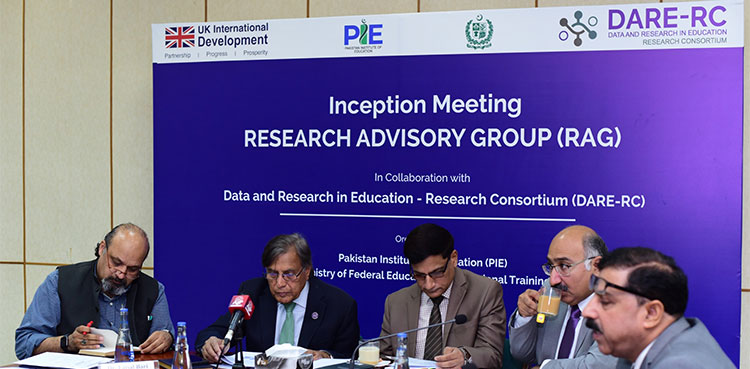Pakistan Institute of Education (PIE) recently hosted the inaugural session of its Research Advisory Group (RAG), marking a significant milestone for the institute.
The meeting brought together renowned educationists, researchers, and stakeholders from across Pakistan to shape the research agenda for the country’s education sector. This collaboration aims to position PIE as a leading public sector think tank, providing valuable insights for education sector policy-making.
The event saw the participation of distinguished guests, including Mr. Sohil Akhtar from the Ministry of Federal Education and Professional Training (MOFEPT), Dr. Muhammad Shahid Soroya, Director General of PIE, Dr. Nizamuddin, Dr. Farid Pinjwani, Dr. Shahid Munir Chairman Punjab HEC, Dr. Faisal Bari from LUMS, and Dr. Jamila Razzaq, Research Lead of DARE-RC.
During the session, Mr. Sohil Akhtar emphasized the importance of the consultation, focusing on brainstorming research topics and themes. The discussions revolved around utilizing PIE’s flagship reports like the Pakistan Education Statistics (PES) Report and the National Assessment Test (NAT) Report to identify priority research areas aligned with Pakistan’s education landscape.
Dr. Muhammad Shahid Soroya provided an overview of PIE, emphasizing its role as a premier “Think Tank” supporting evidence-based policy formulation. He highlighted PIE’s commitment to enhancing the quality and impact of educational research in Pakistan. The collaboration with the RAG signifies PIE’s dedication to informing effective educational policies and driving positive change.
The RAG serves as a crucial advisory body, offering expert guidance on educational research and its application in Pakistan. Its formation aligns with PIE’s strategic vision to tap into insights from seasoned professionals and direct research efforts towards addressing key challenges in the education sector.
The meeting included presentations on PIE’s organizational structure, ongoing work, and an overview of RAG’s mandate. Central to the discussions was a collaborative brainstorming session on potential research topics and themes. Moreover, productive dialogues centered on enhancing collaboration between PIE, universities, and research institutions.










